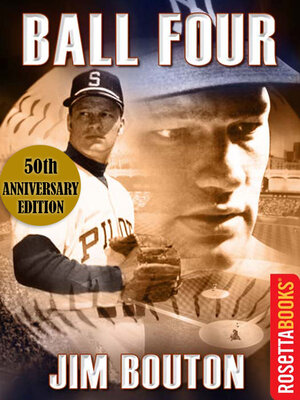
Sign up to save your library
With an OverDrive account, you can save your favorite libraries for at-a-glance information about availability. Find out more about OverDrive accounts.
Find this title in Libby, the library reading app by OverDrive.



Search for a digital library with this title
Title found at these libraries:
| Library Name | Distance |
|---|---|
| Loading... |
The 50th Anniversary edition of “the book that changed baseball” (NPR), chosen by Time magazine as one of the “100 Greatest Non-Fiction” books.
When Ball Four was published in 1970, it created a firestorm. Bouton was called a Judas, a Benedict Arnold, and a “social leper” for having violated the “sanctity of the clubhouse.” Baseball commissioner Bowie Kuhn tried to force Bouton to sign a statement saying the book wasn’t true. Ballplayers, most of whom hadn’t read it, denounced the book. It was even banned by a few libraries.
Almost everyone else, however, loved Ball Four. Fans liked discovering that athletes were real people—often wildly funny people. David Halberstam, who won a Pulitzer for his reporting on Vietnam, wrote a piece in Harper’s that said of Bouton: “He has written . . . a book deep in the American vein, so deep in fact that it is by no means a sports book.”
Today Ball Four has taken on another role—as a time capsule of life in the sixties. “It is not just a diary of Bouton’s 1969 season with the Seattle Pilots and Houston Astros,” says sportswriter Jim Caple. “It’s a vibrant, funny, telling history of an era that seems even further away than four decades. To call it simply a ‘tell all book’ is like describing The Grapes of Wrath as a book about harvesting peaches in California.”
Includes a new foreword by Jim Bouton's wife, Paula Kurman
“An irreverent, best-selling book that angered baseball’s hierarchy and changed the way journalists and fans viewed the sports world.” —The Washington Post
When Ball Four was published in 1970, it created a firestorm. Bouton was called a Judas, a Benedict Arnold, and a “social leper” for having violated the “sanctity of the clubhouse.” Baseball commissioner Bowie Kuhn tried to force Bouton to sign a statement saying the book wasn’t true. Ballplayers, most of whom hadn’t read it, denounced the book. It was even banned by a few libraries.
Almost everyone else, however, loved Ball Four. Fans liked discovering that athletes were real people—often wildly funny people. David Halberstam, who won a Pulitzer for his reporting on Vietnam, wrote a piece in Harper’s that said of Bouton: “He has written . . . a book deep in the American vein, so deep in fact that it is by no means a sports book.”
Today Ball Four has taken on another role—as a time capsule of life in the sixties. “It is not just a diary of Bouton’s 1969 season with the Seattle Pilots and Houston Astros,” says sportswriter Jim Caple. “It’s a vibrant, funny, telling history of an era that seems even further away than four decades. To call it simply a ‘tell all book’ is like describing The Grapes of Wrath as a book about harvesting peaches in California.”
Includes a new foreword by Jim Bouton's wife, Paula Kurman
“An irreverent, best-selling book that angered baseball’s hierarchy and changed the way journalists and fans viewed the sports world.” —The Washington Post







